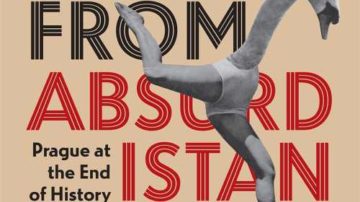Alena Dvořáková at the Dublin Review of Books:
 Postcards from Absurdistan is the third volume in a ‘loose trilogy of cultural histories’ in which Derek Sayer has argued that European modernity is best examined from a vantage point located, both literally and figuratively, in Bohemia and its capital, Prague. The first volume, The Coasts of Bohemia (1998), tackled the issue of national identity. It presented Czech history – from its mythic beginnings to just after the communist takeover in 1948 – as a lesson on the nature of national historiography. When a ‘small’ nation has, for most of its past, struggled for recognition, its history is bound to consist of attempts to re-invent the past in order to assure itself of a future. The form of this reassurance: a bricolage of national treasures assembled largely under the motto ‘small but ours’. Focusing on the main tropes of the Czech National Revival – especially the emphasis on the Czech language as the basis for national identity, and the encoding of Czechness as something anti-German, anti-aristocratic and anti-Catholic – Sayer presents this chequered history as a corrective to the national histories of bigger, older, more secure nations. A lot of what he marks out as specifically Czech, however, sounds very familiar in the Irish context. None better than the Czechs at understanding Irish people’s fondness for the ‘best little country in the world’ trope (including its associated ironies) and the pitfalls of turning a language into a crux of nationality.
Postcards from Absurdistan is the third volume in a ‘loose trilogy of cultural histories’ in which Derek Sayer has argued that European modernity is best examined from a vantage point located, both literally and figuratively, in Bohemia and its capital, Prague. The first volume, The Coasts of Bohemia (1998), tackled the issue of national identity. It presented Czech history – from its mythic beginnings to just after the communist takeover in 1948 – as a lesson on the nature of national historiography. When a ‘small’ nation has, for most of its past, struggled for recognition, its history is bound to consist of attempts to re-invent the past in order to assure itself of a future. The form of this reassurance: a bricolage of national treasures assembled largely under the motto ‘small but ours’. Focusing on the main tropes of the Czech National Revival – especially the emphasis on the Czech language as the basis for national identity, and the encoding of Czechness as something anti-German, anti-aristocratic and anti-Catholic – Sayer presents this chequered history as a corrective to the national histories of bigger, older, more secure nations. A lot of what he marks out as specifically Czech, however, sounds very familiar in the Irish context. None better than the Czechs at understanding Irish people’s fondness for the ‘best little country in the world’ trope (including its associated ironies) and the pitfalls of turning a language into a crux of nationality.
more here.
